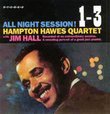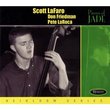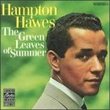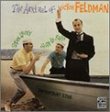| All Artists: Hampton Hawes Title: For Real! Members Wishing: 1 Total Copies: 0 Label: Jvc Japan Release Date: 1/24/2007 Album Type: Import Genres: Jazz, Pop Style: Bebop Number of Discs: 1 SwapaCD Credits: 1 |
Search - Hampton Hawes :: For Real!
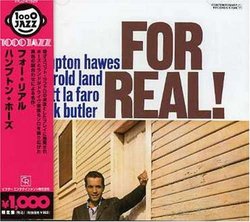 | Hampton Hawes For Real! Genres: Jazz, Pop
|
Larger Image |
CD DetailsSimilar CDs
|
CD ReviewsFast Company Samuel Chell | Kenosha,, WI United States | 12/28/2006 (5 out of 5 stars) "As good as Hampton Hawes was, I'm not convinced he's on the same level as his formidable bandmates on this date. I caught him live only once--in the mid-seventies when he was content to play Fender Rhodes--and he swung and played with expressive fire even on the monotonous electric piano. On acoustic piano, many of his licks are reminiscent of Horace Silver, though he clearly had more chops than Horace; his touch--light, nimble, precise, and curiously "staccato"--is close enough to Andre Previn's to make distinguishing the two difficult at times. Hamp definitely was one of the better pianists on the West Coast if not American scene in the 1950s. But the only pianist I've heard who was capable of following the sublime and masterful Harold Land during this period (1958), after the latter's departure from the Max Roach-Clifford Brown Quintet, was Carl Perkins, whose life was tragically shortened by some of the same bad habits that plagued Hamp. Just as well Carl wasn't on this date, because Amazon doesn't permit awarding more than 5 stars. As for Land, if Hank Mobley was the "middleweight champion" of the tenor sax (Leonard Feather's characterization of him) on the East Coast, Harold certainly could claim that title on the West Coast. Land was the more precise, "organized" soloist, seeing the whole playing field and negotiating it with awesome grace; Mobley the more lyrical and reactive player, singing his blues-based heart out in whatever musical context he found himself in. Both players began to lose some of the breath support required for a vibrant sound as early as the mid-sixties, but before 1965 I can think of no two players in jazz who wear better on recordings, day in and day out. On this Hawes date Harold is the stand-out player. Frank Butler's clean and precise playing is a perfect complement to both Hawes and Land. He may be the most underrated drummer in the history of jazzl it would certainly be impossible to overrate him--given his talentsand comparative anonymity--as a soloist or, in this case, a supportive contributor. The man simply had it all, making his most memorable contributions within the context of the quintessential Curtis Counce Quintet. Before Scottie LaFaro went with Bill Evans, he laid down walking 4/4 bass lines with the best construction workers on the instrument--Brown, Watkins, Chambers, and Sam Jones included. And he plays melodic lines during his solos on the present session, presaging his reinvention of the instrument's role. Finally, I compared this recording with a new one by a bass player of note, and guess which had the clearer, more definitive, more "true" sound. The advantage is Scottie's by a wide margin (whether the credit/blame should go to Scottie or the recording engineers of the respective sessions, I can't say. Increasingly, I'm hearing overly boosted, muddy, poorly defined bass sounds on location as well as on record). At first the tunes sounded a bit weak, overly familiar. "Wrap Your Troubles" rests in an uneasy middle ground between ballad and funk, and two of the "originals" are thinly disguised reworkings of "Has Anybody Seen My Gal" and "The Preacher" (itself a reworking of "Show Me the Way to Go Home"). But after a third playing the strength of the solos more than compensated for the lack of instantly gratifying grooves. These players don't require formulae, gimmicks, and exaggerated devices of any sort to locate a groove that is as naturally deep as it is fertile. Back to the earlier point about the "technology," I've heard all of the unstinting praise of Rudy, and I've heard Metheny proclaim how lucky we all are to be living in a new millennium when audio recording has become so advanced that we can hear his fingers slide on the guitar strings. Nonetheless, it would be hard to improve on the 1950s' recordings produced by Lester Koenig and engineered by Roy DuNann. Unlike the boomy new recordings I've been picking up of late, the bass of Scott La Faro is absolutely "right"--gritty and gutty but also crystalline clear, with resonating but sharply delineated pitches; and the lockstep and interplay between him and the tight and crisp percussion of Butler is a constant source of delight. Made 49 years ago, this recording is, simply, as good as it gets. In that respect, Scotty and we are inarguably the lucky ones. I hope there are still young listeners (especially bassists and drummers) to take note and learn." An angel on one shoulder a devil on the other Joel Schneider | San Francisco, USA | 10/07/2006 (5 out of 5 stars) "If you like your bop cooked up with lots of grease this is the session for you. Hamp's playing is superbad throughout. Check out the title track, "For Real!". This is one of the great piano solos of all time. He sounds like a preacher calling down from his pulpit, sending out the word to his flock. The solo is long but never once loses the thread of the story it has to tell- a perfect balance of the sacred and the profane. Hamp's comping alone is worth the price of admission - a combination of sanctified feeling and street smarts that propels the groove like a smooth running engine. The rythmn section smokes with the great, underrated Frank Butler on drums and bass messiah Scott LaFaro stirring things up. If you never heard LaFaro play straight ahead check this cd out immediately. He swings as hard as Chambers or Heath and while accompanying beautifully still manages to project his larger than life personality without dominating. What an incredible loss! whether it be with Ornette or Bill Evans or a down home session like this, Scott LaFaro could deliver the goods. This is a recording that stands the test of time. "For Real!" was recorded in 1959 and Hamp was at that point probably to "Hip" for his own good. With an angel on one shoulder and a devil on the other he couldn't keep things going forever. He was arrested shortly after the session and spent the next five years in federal prison. Oh well that's another horror story. At least for this recording you can tell that Hamp, like the other players, was definitely feeling good. " Birds of a Feather Dion Wright | Flagstaff, AZ | 01/21/2004 (5 out of 5 stars) "Hampton Hawes was the foremost bop pianist on the west coast for years. I felt that he fell off musically after his bust, but this pre-jail offering shows him at his best. Hamp was a bouncing fellow behind Howard Rumsey, Shorty Rogers, and other classic West Coast heavy hitters of the 50's. In this "For Real" album his ideas can be heard to greater definition, maybe because of the small ensemble. He is equally intelligent in the album he made with Charles Mingus and Danny Richmond. Comparing those two albums defines Hamp nicely, on account of the contrast between Mingus and La Faro. I disagree that Scotty La Faro (which means "lighthouse; how appropriate) is a "sissy" on the Bill Evans albums. Bill ran a different sort of operation, more excruciatingly introverted, going for the subtleties rather than the broad strokes, and Scotty conformed well to that set. Not enough Scotty left around to suit me."
|

 Track Listings (6) - Disc #1
Track Listings (6) - Disc #1